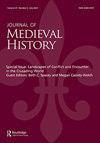国会、政治与礼仪:国会模式与爱德华二世治下的领土划分
IF 0.3
2区 历史学
0 MEDIEVAL & RENAISSANCE STUDIES
引用次数: 0
摘要
莫杜斯·特内迪议会长期困扰着学者。一个多世纪以来,他们一直在努力理解其中的26章,这些章旨在描述英国议会数百年的传统、职能和程序。出现了许多假设来解释其汇编,最值得注意的是,它是兰开斯特人的政治宣言、法律论文或行政改革计划。在这次讨论中,我认为需要一种新的方法。虽然我同意学术界的共识,即《莫杜斯》最初写于爱德华二世统治时期(1307-27),但我认为它是困扰政治界的深层政治裂痕的产物。其决定性特征是试图在交战派别之间找到中间立场,其目的是将议会视为重新达成政治共识的重要制度背景。本文章由计算机程序翻译,如有差异,请以英文原文为准。
Parliament, politics and protocol: the Modus tenendi parliamentum and the settlement of the realm under Edward II
ABSTRACT The Modus tenendi parliamentum has long perplexed scholars. For over a century they have battled to make sense of its 26 chapters, which purport to describe the centuries-old traditions, functions and processes of the English parliament. A number of hypotheses have emerged to explain its compilation, most notably that it was a Lancastrian political manifesto, a legal treatise or an administrator’s programme for reform. In this discussion I argue that a fresh approach is needed. Whilst agreeing with the scholarly consensus that the Modus was originally written in the reign of Edward II (1307–27), I suggest instead that it was a product of the deep political fissures which bedevilled the political community. Its defining characteristic was an attempt to steer a middle ground between the warring factions, and its purpose was to project parliament as the vital institutional context for renewed political consensus.
求助全文
通过发布文献求助,成功后即可免费获取论文全文。
去求助
来源期刊

JOURNAL OF MEDIEVAL HISTORY
MEDIEVAL & RENAISSANCE STUDIES-
CiteScore
0.60
自引率
0.00%
发文量
29
期刊介绍:
The Journal of Medieval History aims at meeting the need for a major international publication devoted to all aspects of the history of Europe in the Middle Ages. Each issue comprises around four or five articles on European history, including Britain and Ireland, between the fall of Rome and the Renaissance. The Journal also includes review articles, historiographical essays and state of research studies.
 求助内容:
求助内容: 应助结果提醒方式:
应助结果提醒方式:


